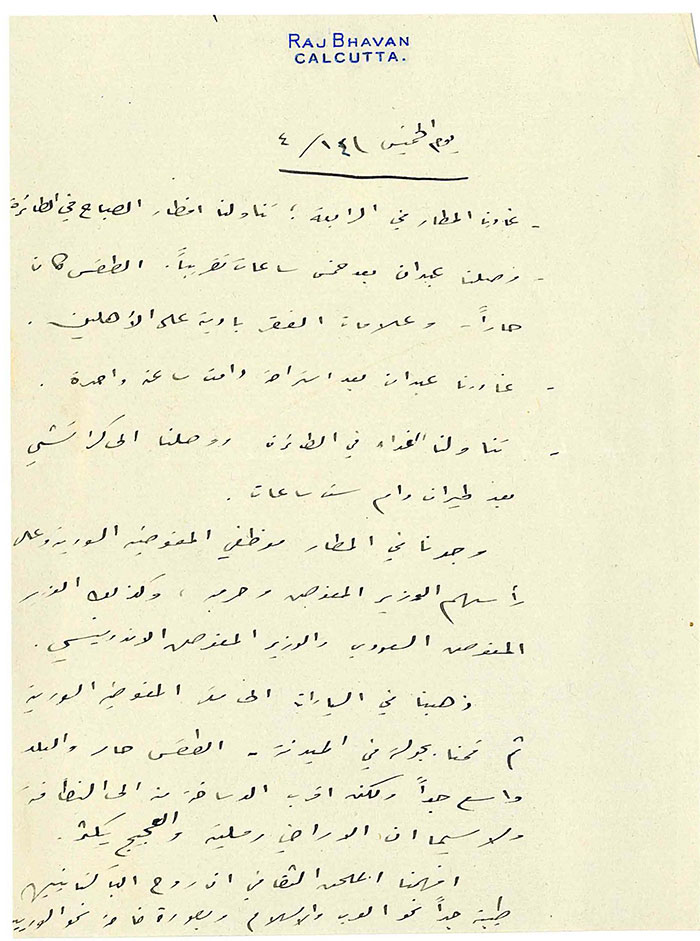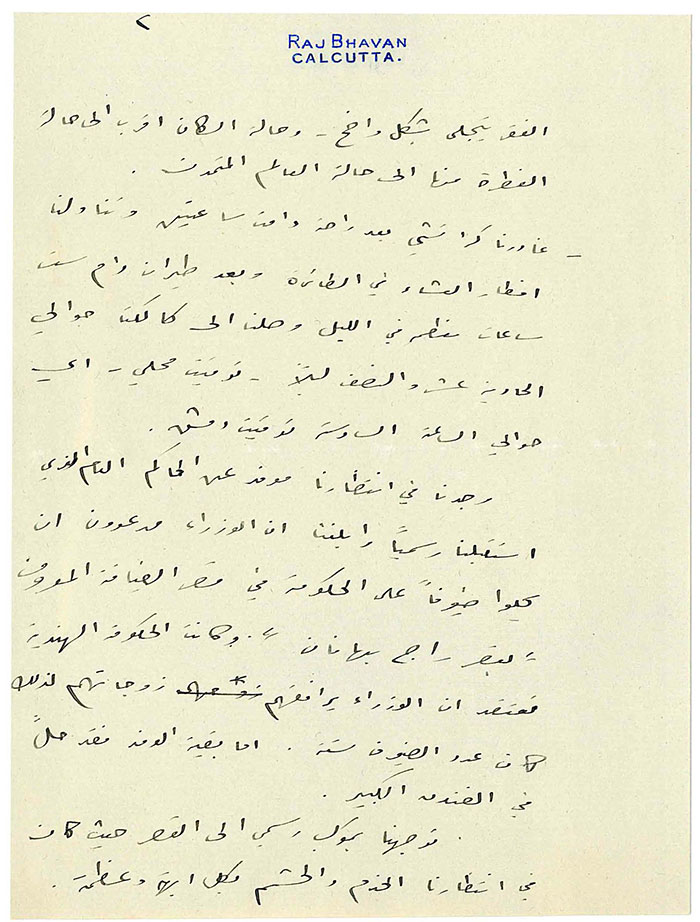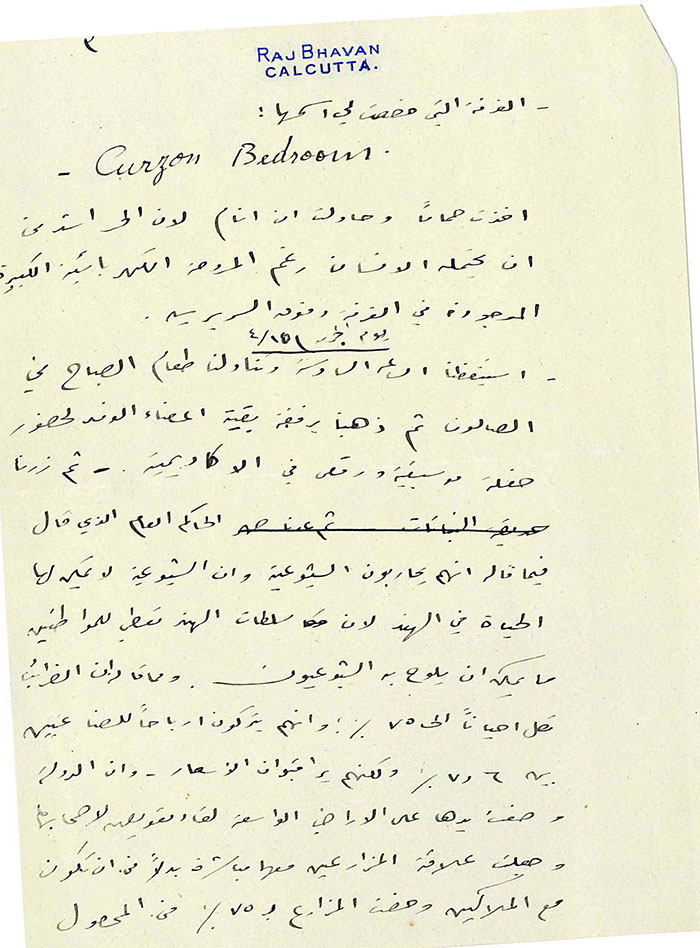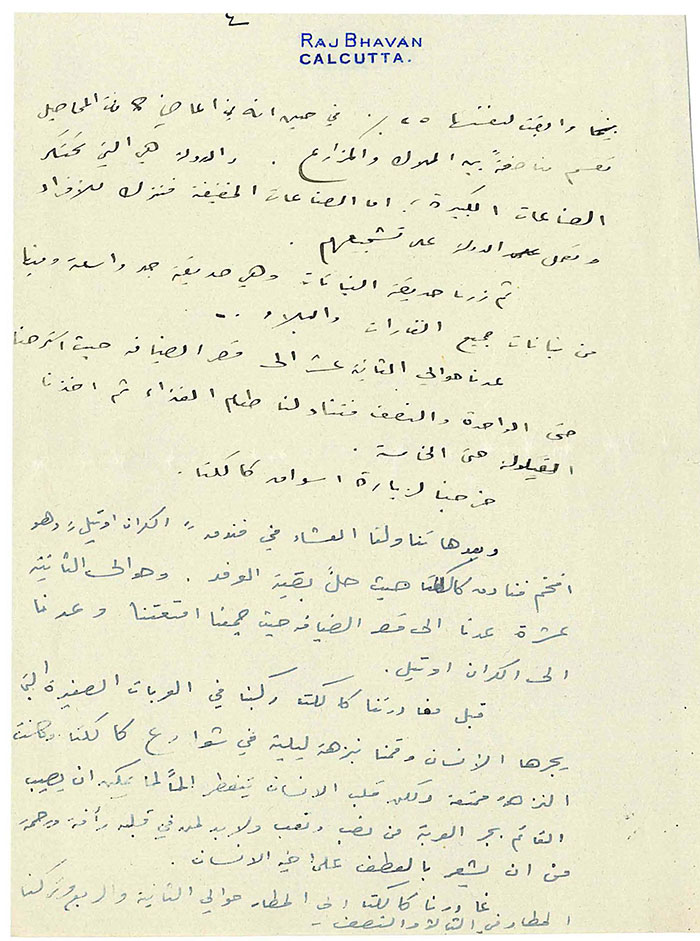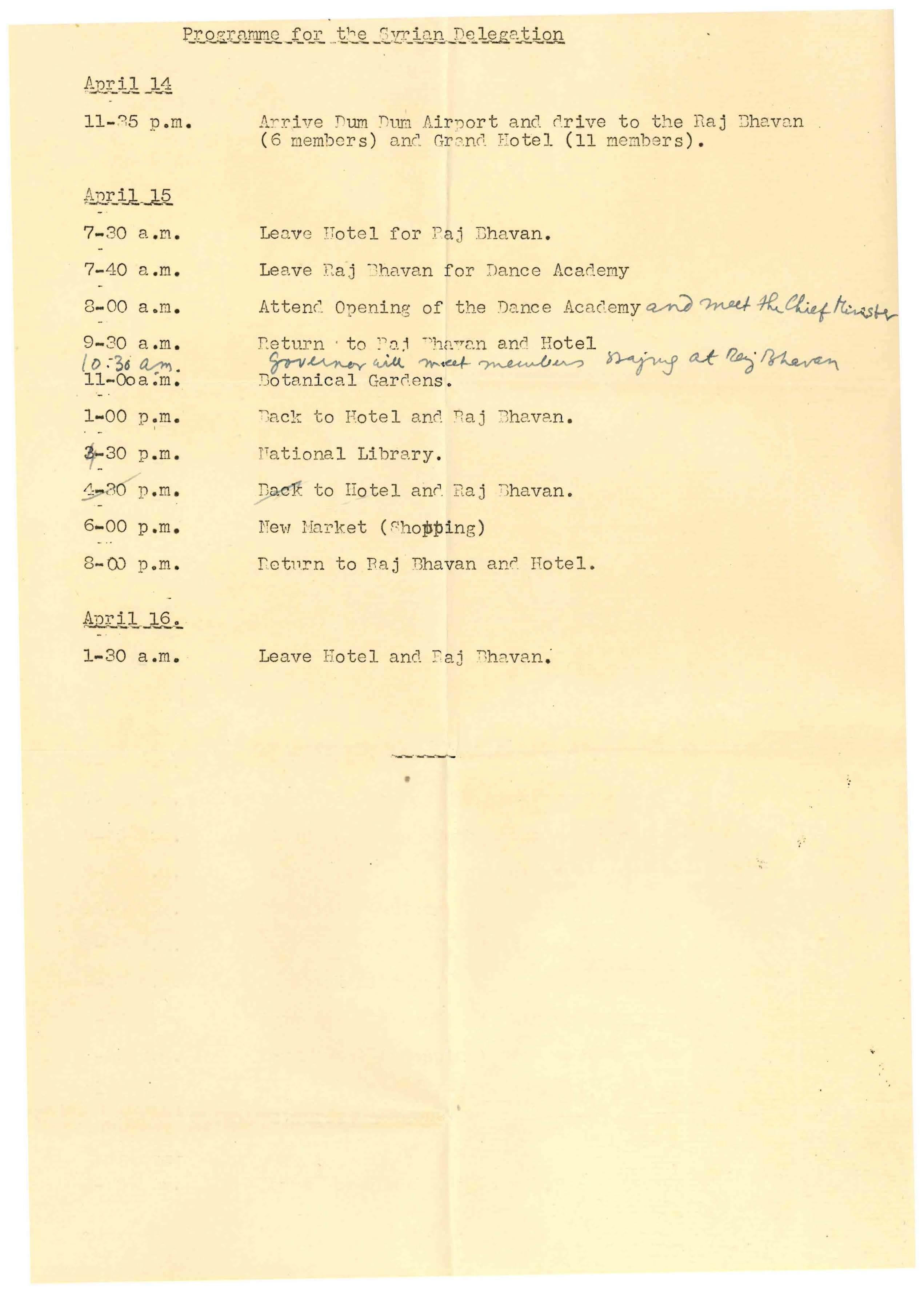The Bandung Diaries - April 1955
The Bandung Diaries
Thursday 14th April 1955
We left the airport at about 4.00 am; we had breakfast on the plane. We arrived at Abdan, approximately, 5 hours later.
The weather was very hot; signs of poverty could be clearly seen among locals. We left Abdan after having spent only one-hour on the ground.
We had lunch on the plane and arrived in Karachi after a six-hour flight. We were received at the airport by the Syrian Embassy staff led by the Ambassador plenipotentiary and his wife, in addition to the Saudi and Indonesian Ambassadors plenipotentiary.
We went to the Syrian Embassy, then we went on a tour around the city. The weather was hot, and the city was huge. One could not describe it as clean, especially with its sandy soil and sand storms. The Cultural Attaché pointed out to us that Pakistanis are very warm-hearted towards Islam and Arabs, especially Syrians. Poverty was unmistakable though, and the locals were rather primitive.
We left Karachi after a two-hour break. We had dinner on the plane, the flight took six hours, mainly during the night. We arrived in Kolkata around 11.30 p.m. local time roughly (6.00 p.m. Damascus time). An envoy of the Governor General was there, and he received us officially. He explained that the Ministers were invited to stay as guests of Government at the reception Palace, which is known as “Raj Bhavan”.
The Indian government had assumed that the Ministers were accompanied by their wives; therefore, they were expecting 6 guests.
The rest of the delegations stayed at the Grand Hotel. We headed to the Palace in an official motorcade, where the servants and attendants were waiting for us. My room was called the “Curzon Bedroom”. I took a shower and tried to sleep as the heat was unbearably scorching, despite the large fan over my bed.
Friday 15th April 1955
We woke up at 6.00 am and had breakfast in the hotel’s lounge. We went, along with the rest of the delegations to attend a concert and dancing performance at the local academy.
We visited the Governor General. He told us during the meeting that they were fighting Communism and that Communism has no place in India, because the authorities are already giving the people whatever Communism might be promising them. He added that taxes can go up to 75% in certain cases, and that they leave 6% to 7% profit to the Industrialists while simultaneously controlling prices.
He pointed out that the State took possession of vast lands and compensated the owners, which put the farmers in direct contract with the Government rather than the landlords. It also allocated 75% of the crops to the farmers and 25% to the state, whereas previously it used to be shared equally between the landlords and the farmers. The State monopolises big industries while leaving light industries to individuals; giving them its support.
We visited the Botanic Park, it was extensive, containing plants from all over the world. We returned to the Palace at about 12.30 pm we had some rest until 1.30 pm after which we had lunch and then had a siesta until 5.00 pm.
We visited the Kolkata markets, then had dinner at the “Grand Hotel”; it is one of the most prestigious hotels in the City, where the rest of the delegations had stayed. We returned to the Palace at around midnight and we packed our luggage before returning to the Grand Hotel.
Before leaving Kolkata, we boarded a passenger cart pulled by a man and took a night tour of the city’s streets. It was a pleasant tour; but it was heartbreaking too, as one could not help but feel for the poor man pulling the cart, who must have been totally exhausted. We left Kolkata and headed to the airport at about 2.15 am; our plane took off at 3:30 a.m.
Saturday 16th April 1955
We arrived in Bangkok at about 8.00 am. The airport was bustling with people, military personnel, civilians, and students. We learned that they had gathered to greet the Premier of the People's Republic of China, Zhou Enlai, who had left the airport, moments before our arrival. We had a short break then returned to board the plane that took off heading to Singapore. We arrived in Singapore at about 1.30 pm. We sorted out our luggage, then headed to “Raffles Hotel”, one of the largest in Singapore.
The rooms we were given consisted of a reception area, a bedroom and a bathroom. My room was excellent; it had brilliant air-conditioning that kept me cool despite the heat.
Prior to dinner, we went to the shops to pick up a few things. After shopping, I wrote a memorandum to Damascus.
We had dinner at the hotel, Al Kailani, Al Shuqairi and myself, followed by a tour of the city by car. We stopped at a theme park where we spent an hour or so, then went back to the hotel at around midnight.
We woke up at 6.00 am and left the hotel at around 6.45 am.
Sunday 17th April 1955
We arrived at the airport, where we had breakfast, then headed to board the plane at around 8.00 am. On our way, we crossed the equator and were, therefore, granted membership of the Neaton Club. The membership certificate is usually given to anyone who crosses the equator.
We faced a storm during our flight and were asked to tighten our seat belts. Luckily, the heavy rain and strong wind did not last for long. We arrived in Jakarta at around 10.30 and were received by the Indonesian Prime Minister. We had taken the same flight as the Ceylonese delegation, which was one of the delegations that had called for and organised the Bandung conference. The reception we had was superb.
We had some rest, while our belongings and luggage were moved to a private jet which was part of Indonesian Airlines. We then boarded the plane which took us to Bandung. The flight took less than 30 minutes.
There were special cars waiting for us when we arrived at the airport, the Syrian flag was flown on one of them. We were escorted by a military motorbike and a vehicle carrying soldiers.
We toured the streets of Bandung, they were all decorated with flags. We arrived at the Syrian delegation’s residence, which was in one of the most beautiful parts of the city. Khalid Mardam Bek, his wife, Fakhir Al Kailani, Nizar Kailani, Muwafaq Al Qudsi and myself stayed at the residence while the rest of the delegation stayed at one of Bandung hotels.
It is worth mentioning that private residences were only allocated for a few of the delegations including those of Egypt and Syria.
We had lunch and some rest. In the evening, the Ministers were invited to a dinner reception hosted by the Egyptian delegation. All the different Arab delegations met at the event to discuss which positions we should adopt regarding issues that mattered to the Arab world.
Monday 18th April 1955
The conference commenced at 9.00 am, in the presence of the Indonesian President, the Vice President and Prime Minister. The President delivered an extensive opening speech; it tackled the state of affairs in a number of Asian and African countries that were struggling under colonialism. He declared that the people of those continents would not rest until all nations within them were liberated.
The Indonesian Prime Minister was elected President of the Conference and delivered a speech
.
Some delegations expressed objections over the agenda which had been prepared the day before by the heads of delegations who had already arrived in Bandung. The session was, therefore, suspended. Heads of delegations were called for a meeting to agree on an agenda, whether the conference would be on the record or off the record and whether the speeches would be read out or circulated.
The heads of delegations meeting lasted for about two hours, the President then announced that they would resume deliberating after 3.00 pm.
The heads of delegations meeting commenced at 3.00 pm, after they had agreed on the agenda. It was left to the delegations to choose whether they would like to read out their speeches, provided they did not take longer than 15 minutes, or circulate them.
Sessions were suspended until 9.00 am the following day.
The delegations were invited to a reception hosted by the President of Indonesia. It was a magnificent celebration where national songs and live music were played using traditional instruments.
Tuesday 19th April 1955
The Cultural Committee held a meeting with a representative from Syria in attendance. The delegates discussed whether to elect a Vice President of the Cultural Committee or not; they eventually agreed to do so.
Saudi Arabia nominated Syria for the seat; the Arab countries agreed, in addition to Pakistan, India, and China. I was elected Vice President of the Cultural Committee; the President invited me to sit to his right, which I did after addressing the delegations to express my appreciation for their decision.
Some of the participating delegations asked for the meeting to be postponed until the following day, to allow participants to review the proposals. The President agreed, and the consequent session was held on the following day at 9.00 am.
I attended the afternoon meeting where Khalid Mardam Bek delivered the Syrian delegation’s speech.
I joined the Indian President, Nehru, for lunch.
Wednesday 20th April 1955
The Cultural Committee held a meeting where representatives from participating states held talks. It was decided to elect a committee of 12 members to draft a report to be presented to the General Board. It was then agreed to suspend the session until 9.00 am of the following day.
The Political Committee convened in the afternoon, I attended the meeting where Mr Al Shuqairi delivered a speech for the Palestinian delegation. He gave a brilliant speech advocating the Palestinian Cause. Pro-Israeli sentiments were presented by the Indian, Burmese and Philippino delegations.
Thursday 21st April 1955
Considering the Committee’s failure to conclude its work, the meeting was postponed until 3.00 pm.
I attended the Political Committee’s meeting, where a satisfactory statement was passed stating the support of Arab states for the Palestinian Cause. Another statement was approved declaring support for African nations in general, and particularly the Maghreb, in attaining its liberty and independence.
The committee failed to draft a report, therefore, the General Board meeting was postponed until 9.00 am the following day.
I attended the political committee meeting.
Friday 22nd April 1955
The Cultural Committee convened in the morning and heard the draft report set out by its subcommittee. Following deliberation, the report and recommendations were passed with some comments.
The President addressed members of the delegations expressing his appreciation. They thanked the President and the Vice President, in turn. I was grateful that the President was able to carry out his duties with no disruption. My role was, therefore, merely supportive.
The Political Committee held a meeting in the afternoon where I was present.
Saturday 23rd April 1955
The Political Committee held its final meeting before midday, which I attended. The Cultural Committee also passed its report in the afternoon.
